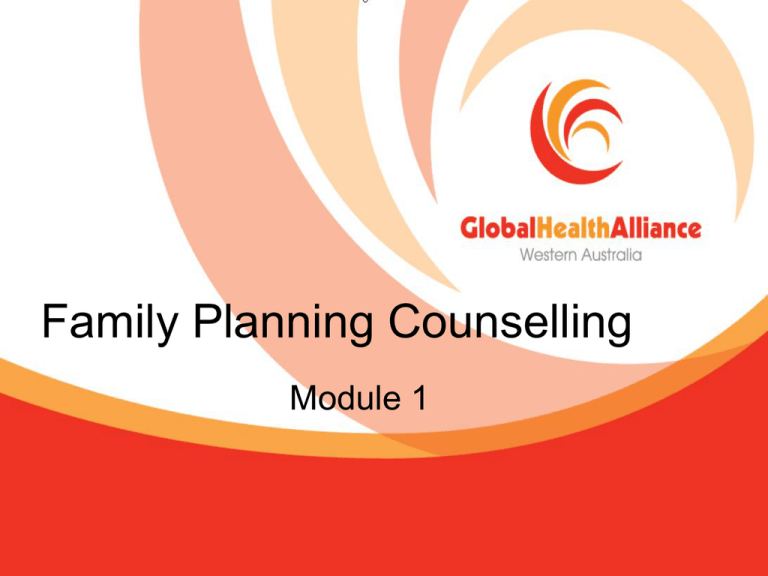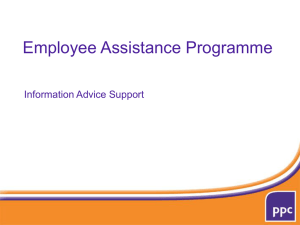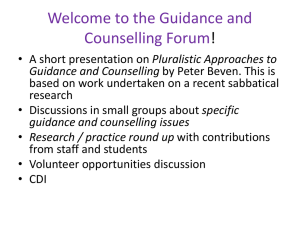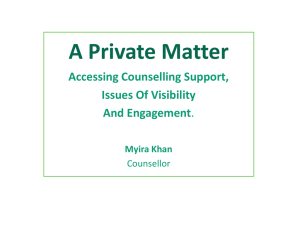
Family Planning Counselling
Module 1
AIM
To prepare midwives to provide effective
family planning counselling to women
and their families
Acknowledgement
• This powerpoint presentation is adapted and
used with permission from:
Family Planning Training Project
www.fptraining.org/project
Family Planning
Counselling
Session I:
Learning Outcomes
• Explain how to support informed choice and maintain
confidentiality
• Discuss sexual health without embarrassment
• Demonstrate how to help clients discuss and negotiate
FP use with partners
• Identify beliefs and attitudes that may interfere with
effective counseling
• Describe the four stages of FP counseling and factors
that affect FP method choice
• Demonstrate how to use a counselling tool and other
job aids effectively
• Demonstrate effective communication and counselling
skills
• Demonstrate competence in providing informed
choice FP counselling
• Explain the counselling needs of women who are
postpartum and post abortion
• Explain how traditions or beliefs may limit a woman’s
ability to freely choose and use FP
Personal Goals for FP Counselling
• What motivated you to become a health
worker?
• Why do you think FP counselling is important?
• What are your goals for counselling
community members or clients about FP?
• What do you hope will happen?
• What community problems will
good FP counselling help with?
What is Informed Choice?
All family planning clients have the right to
informed choice:
• Opportunity to freely choose among options
and
• Complete, accurate information that is easy to
understand about appropriate, available options
Clients Have a Right to Freely Choose
Whether to:
• Have children, and how many to have
• Use FP or not
• Be tested for STIs/HIV
• Use condoms
• Have one or more sexual partners
• Talk with partner about condoms or FP
• Reveal their HIV status
Maintaining Confidentiality
• Confidentiality is a client’s right
• All sessions with FP clients must be kept
confidential
• Do not tell anyone what client has told you or
show client records to anyone except a health
provider
• Assuring clients of confidentiality helps them to
relax and share more openly
Effective FP Counselling
• Communication and counselling skills,
including skills of giving focused information
• Ability to guide the client through the
counselling process
• FP methods information
How Do We Communicate?
Interpersonal communication is:
• Nonverbal communication:
Face-to-face exchange of information, ideas or
feelings through facial expressions, gestures and
body positions
• Verbal communication:
Face-to-face exchange of information, ideas or
feelings through use of the voice
Effective Non-verbal Communication
• Paying full attention—listening
• Relaxed and accepting body postures facing the
client
• Facial expressions that show interest, acceptance
and concern (smiling)
• Encouraging gestures (nodding the head)
• Avoiding checking watch or looking away
Help establish a good connection
Effective Verbal Communication
Active Listening:
• Giving verbal encouragement
• Using appropriate tone of voice
• Paraphrasing what the client says
• Reflecting feelings
Paraphrasing and Reflecting Feelings
Purpose:
• Lets client know you are listening
• Checks that you have understood
• Reflects the client’s feelings about
situation
• Summarizes or clarifies what client says
Using Simple, Clear Language
• Use words and explanations that clients can
easily understand
• If clients do not understand, they may not:
– Ask for clarification
– Make good decisions
– Follow instructions
Other Key Counselling Skills
• Remain nonjudgmental and avoid using
judgemental words
• Discuss sexuality and sexual practices
comfortably
• Help clients prepare to talk with partners
about FP
• Ask questions effectively
Purpose of Asking Questions
• Assess client’s needs and concerns
• Involve client in conversation
• Help client express feelings and attitudes
• Show interest and concern
• Determine what client already knows
• Identify misinformation or myths to correct
Types of FP Counselling Questions
Two types:
• Do you wish to have children in the future?
• How may I help you today?
How can I help you today?
• Are you using a family planning method now?
• Are you worried you might be pregnant?
• Would you like to choose a method?
• Do you have a question or problem about a
method?
• Do you have any concerns about sexually
transmitted infections (STIs) or HIV/AIDS?
• Other needs?
Tips for Asking Questions Effectively
• Use a tone of voice that shows interest
• Ask one question at a time, wait for answer
• Ask questions that encourage client to express needs
• Avoid leading questions
• Avoid judgmental questions or questions starting with
“Why” or “Why didn’t you?”
• Repeat a question in different way if client has not
understood
• If asking a delicate question, explain why
Negotiating Family Planning Use
• “What are some reasons a woman’s partner
may give her for not using FP or why he
doesn’t like FP?”
• How can you help a client prepare to
negotiate FP use with a partner?
Counselling is Not …
• Solving a client’s problems
• Telling a client what to do or making decisions for
client
• Judging, blaming, or lecturing a client
• Interrogating a client
• Imposing your beliefs
• Pressuring a client to use a specific method
• Lying to or misleading a client
Family Planning
Counseling
Session II:
Beliefs and Attitudes
• Be aware of your beliefs and attitudes
• Clients may not return if they feel judged or
pushed
• Remain neutral and nonjudgmental
• Respect the rights of your clients
• Practice helps
Communication and Counselling Skills
• Success of FP counselling depends on ability to
establish and maintain a good connection:
– Builds trust
– Helps client relax
– Helps client communicate openly
• Good communication and counselling skills are keys
for maintaining good connection throughout the
counselling session
Communicating Effectively and
Maintaining Rapport
•
•
•
•
•
•
•
•
•
•
•
Show respect
Be relaxed, friendly and attentive
Use simple, clear language
Use open-ended and probing questions appropriately
Listen carefully to client
Ask client about feelings
Encourage client participation
Explain what will occur during visit and procedures
Ensure client understanding and correct misunderstandings
Use job aids appropriately
Correctly record information on data-collection forms
Stages of FP Counselling
1
Establish rapport and assess client’s
needs and concerns
2
Provide information to address
client’s needs and concerns
3
Help client make an informed
decision or address a problem
4
Help carry out client’s decision
Counselling Tool for Family
Planning
1
Assess Client’s Needs and Concerns
• Greet client appropriately
• Ensure privacy, confidentiality, and client comfort
• Ask about reason for visit
• Ask about partner(s), home life, family, health, sexual
behavior, HIV status
• Ask about plans to have children, desire for FP
• Explore STI risk and what client does to avoid STIs
Questions About the Client
•
•
•
•
•
•
Ideal family size
Home life
Partner(s)
Health
Sexual behavior
HIV status
2
Provide Information to Address Client’s
Needs and Concerns
Part 1
No method in mind? We can discuss:
• Protection from sexually transmitted
infections (STIs) or HIV/AIDS
• Your experiences with family planning
• What you have heard about family planning
methods
• Your plans for having children
• Your partner’s or family’s attitudes
• Other needs and concerns
Now let’s discuss how
a method can meet
your needs
2
Provide Information to Address
Client’s Needs and Concerns
Part 2
• Inform client when needs or concerns are beyond
provider’s capability
• Advise on how to prevent STIs
• Advise on how to have a healthy pregnancy (if client
wants to become pregnant)
2
Provide Information to Address
Client’s Needs and Concerns
Part 3
• Explain benefits of FP and healthy spacing
• If client wants FP, help client identify methods
suited to her needs
• Give information on methods of interest
• Respond to other client questions or concerns
2
Provide Information to Address
Client’s Needs and Concerns
Part 4
• Ask these 4 questions to identify methods suited to
client’s needs and goals:
1. Do you wish to have children in the future?
2. Are you breastfeeding an infant less than six months
old?
3. Do you have the cooperation of your partner in FP?
4. Are there any methods that you do not want to use or
have not tolerated in the past?
How Clients Choose Methods
• Effectiveness
• How long client wants protection from
pregnancy
• Ease of use
• Health benefits and possible side effects
• Safety
3
Help Client Make An Informed
Decision
• Ask client if she or he has any questions about
methods you discussed
• Ask client to choose a method
• Use pregnancy checklist or method screening
checklist to determine if client can use method
• Agree on decision or plan in partnership with
client
What method are you using?
• IUD
• Vasectomy or
Female Sterilization
• The Pill
• Condoms
(Male or Female)
• The Mini-Pill
• Vaginal Methods
• Long-Acting Injectable
• LAM
• Monthly Injectable
• Fertility Awareness-Based
Methods
• Implants
4
Help Carry Out Client’s Decision
• Give FP method and condoms, if needed
• Explain/demonstrate correct use
• Ask client to explain/ demonstrate
• Remind client about side effects, reasons to return
• Role-play or rehearse skills to talk to partner
• Arrange follow-up, resupply, or referral, as needed
Family Planning
Counseling
Optional Session Session III
Serving Diverse Groups
• Different client’s have different needs
• What are some of the special needs of these
groups?
– male vs. female,
– adolescents vs. adults,
– postabortion or postpartum women
• How would you address each of these client’s
needs?
Counselling Needs of Adolescents
• Young people deserve nonjudgmental and respectful
care
• Show them that you enjoy working with them
• Use terms that suit young people
• Try to make sure that a young woman's choices are
her own
• Speak without expressing judgment
• Take time to fully address questions, fears, and
misinformation
How can I help you?
• Anything you want to discuss?
• For example:
• Will parents or partner find out?
• Need contraception?
• HIV/AIDS worries?
• Partner problems?
• Pregnancy?
You are welcome
here any time
• About sex?
• About the body?
Counselling Needs of Men
• How to talk with their partners about family planning and
STIs.
• Encourage men to make decisions about sexual and
reproductive health jointly with their partners.
• Encourage women to bring their partners to see clinical
providers for joint counselling, decision-making, and care.
• Suggest to female clients that they tell their partners about
health services for men. Give female clients informational
materials to take home, if available.
• Correct men’s misperceptions and give them information to
inform their decisions and opinions.
Counselling Needs of Postpartum
Women
• Discuss the importance of birth spacing
• Explain the rapid return to fertility for women who
are not breastfeeding
• Discuss return to sexual activity
• Explain benefits of LAM and exclusive breastfeeding
• Discuss family planning options and when each
method can be started
• Integrate family planning within maternal, newborn
and child health services
How can I help you?
• Plan for the future
• You can become pregnant if
you are not BF
• BF will protect you from
pregnancy for 6 months if
you do not give other food
or drink.
• Many good FP methods to
use while BF
Family Planning Needs of Post
Abortion Women
• Women need easy and immediate access to family planning
services after an abortion
• Women with post abortion complications need support.
- Be understanding
- Be respectful & avoid judgment and criticism
- Ensure privacy and confidentiality
- Ask if she wants someone she trusts to be present during
counselling
• Explain that fertility returns quickly and discuss family
planning options
.
How can I help you?
Let’s discuss your needs:
• You can get pregnant again
quickly
• I can help you choose and use a
method
• All family planning methods are
safe now if you have no infection
Spin the Wheel
Points






